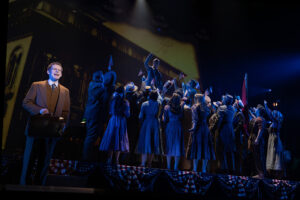You can’t stop the beat in Seattle. About 2,855 miles from the bustling Broadway streets of New York City, the Pacific Northwest gem 5th Avenue Theatre incubates major pre-Broadway tryouts and revives long-beloved classics. Hairspray (2002), Jekyll & Hyde (1995), Shrek the Musical (2008), Catch Me If You Can (2009), Memphis (2009), and Aladdin (2011) all grew up within the walls of the 5th’s storied home. Both its outside façade and grand interior hint at its historic nature: The theatre was completed in 1926, designed by two Europeans after three of Imperial China’s architectural achievements, and celebrated its grand opening with a vaudeville production. During the 1930s, it became a movie palace, but the 1970s recession put out of business what Helen Hayes called “a national treasure” at its 1980 grand reopening.
Since 1989, the 5th has shined as a nonprofit theatre known for high-caliber productions of its own, replete with robust educational and community engagement programs. American Theatre got to catch up recently with executive director Bill Berry over email. The conversation has been edited for length and clarity.
AMERICAN THEATRE: Who founded 5th Avenue Theatre, when, and why?

BILL BERRY: The 5th Avenue Theatre was founded in 1979 by a group of passionate Seattle arts supporters who saw the potential to turn a historic movie palace into a world-class home for musical theatre. The building itself dates back to 1926 and was originally a vaudeville and silent film house. The founders wanted to preserve this architectural gem and fill it with vibrant live performances. Their vision launched what would become one of the country’s leading musical theatre companies.
Tell us a little more about yourself and your background.
I’ve spent my career in theatre because I believe in the power of musical storytelling. I grew up in Wisconsin and later earned my graduate degree in New York. I am a proud member of SDC. Over the years, I’ve worked in a variety of roles (stage manager, casting director, producer, and director) before coming to the 5th. I currently serve on the board of the National Alliance for Musical Theatre and am a member of the Broadway League. I’m deeply committed to building spaces where artists can thrive and audiences feel welcome, entertained, challenged, and inspired. No matter how many times it happens, I still feel that same thrill when the lights come down and a story starts to be told. It never gets old. It always feels like home.
What sets your theatre apart from others in your region?
The 5th Avenue Theatre is unique in that we have a dual commitment to present a season of both locally produced shows and nationally touring productions, all thoughtfully curated for Pacific Northwest audiences. As one of the nation’s largest musical theatre companies, we have also become a vital springboard for new musicals. Since 2001, we’ve produced 25 new musicals, 10 of which have gone on to Broadway and earned a total 15 Tony Awards, including two for Best Musical. Our education and community engagement programs reach tens of thousands annually, and we operate in a historic, breathtaking venue that’s unlike any other. There truly is nothing quite like the 5th Avenue Theatre, and I am immensely proud to come to work each day.
Tell us about your favorite theatre institution other than your own, and why you admire it.
This is a really hard question. It’s like asking me to pick a favorite child! This is such a challenging time in theatre, and I am a huge fan of the work being done across the industry. The way my colleagues are continuing to innovate and make change inspires me daily. With that being said, I deeply admire the work being done at Oregon Shakespeare Festival. Their long-standing commitment to bold storytelling, equity, and community engagement has influenced generations of theatremakers. The consistent excellence of their productions is not only impressive; it’s incredibly inspiring. They’ve created a model for how a theatre can be both artistically daring and socially responsive. Their courage in programming and leadership continues to push the field forward.
How do you pick the shows you put on your stage?
We look for musicals that move people, whether they’re classics reimagined or bold contemporary works. Each season is carefully curated to strike a balance between joy, challenge, and artistry. We ask: Will this story resonate with Pacific Northwest audiences right now? Does it offer opportunities for a diverse range of artists and audiences? Our goal is to build a season that entertains, inspires, and reflects the world we live in. And I think something that always has to be true is: Will this story make the world a better place in some way? It’s a big question—but why tell a story if it isn’t going to move the audience forward in some way or another? That can happen in so many ways, but it should always be present as part of the “why.” Further, I think sometimes the answer can be: It creates space for us as people to laugh and feel joy. We need that space in order to live in the chaotic world we find ourselves in.
What’s your annual budget, and how many artists do you employ each season?
Our annual operating budget is around $29 million. In a typical season, we employ over 700 people. This includes actors, musicians, designers, technicians, creatives, as well as administrative staff. We’re proud to be a major employer of theatre artists in the Pacific Northwest. Supporting the livelihoods of so many talented people is central to our mission.
How has your theatre fared since the end of the Covid-19 lockdown?
Like many in our industry, our financial model was severely impacted by the lockdown. In its aftermath, shifting audience behavior and the skyrocketing costs of producing theatre have only added to the challenges, making innovation and bold strategic shifts essential. One exciting development is our newly announced strategic alliance with Seattle Theatre Group (STG). Through this alliance, STG will take over the lease and management of the 5th Avenue Theatre venue, bringing in additional concerts, comedy shows, and events—a win for increasing downtown activity—while we remain dedicated to producing the first-rate musical theatre our audiences love.
How has your theatre responded to calls for racial justice and more equitable working conditions that have arisen with new urgency in the past few years?
We’ve taken these calls seriously and committed to long-term, systemic change. That included revisiting our hiring practices, increasing transparency, investing in anti-racist training, and ensuring our stages reflect the diversity of our community. Right now we are in the midst of an 18-month partnership with Dr. Naho Shioya and her company SOZO Evolution, LLC to ensure we’re doing everything possible to foster a supportive environment for culture and DEIA. That said, equity is not a box to check; it’s an ongoing journey.
What’s keeping you up at night? And on the other side of that, what’s getting you out of bed in the morning?
Like many in this field, I worry about financial sustainability and burnout among our teams. The financial challenges have put a strain on everything, and that impacts people the most. When we have to cut back on resources it doesn’t make the jobs easier—it makes them harder. But what gets me up in the morning is the possibility of creating joy, sparking empathy, and offering escape or insight to someone sitting in the darkened theatre. I want every person coming into the theatre to feel that thrill when the story starts. This is the power of live performance, and it keeps me going.

What show are you working on now? Anything else in your season that you’re especially looking forward to?
Right now, we’re deep into preparations for the North American tour of Parade, a powerful and timely musical that demands everything from its cast and audience. I’m also especially excited for the national tour of Suffs, which kicks off at the 5th, and for our holiday production of Elf, which brings levity and wonder to audiences of all ages. It’s a beautifully varied season. Personally, I am also working on a production of Jesus Christ Superstar that will close next season—and somehow, the dynamics of power, politics, religion, sacrifice, and fame… well, that just swirls in my head and really sparks something in me.
What’s the strangest or funniest thing you’ve ever seen (or put) on your stage?
I love this question, and I am also drawing a thousand empty blank pages in my mind! What I think I remember the most is when we did a production for Gypsy, and we started tech rehearsals for “Little Lamb” with the cutest actual little lamb onstage in the actor’s arms. Over the four weeks of the show, that lamb grew and grew, until the actor playing Louise was trying to sing while the lamb became increasingly unruly. The actor never gave up on that lamb, though—it appeared nightly, and she would just keep trying to sing it to sleep. Animals onstage—and baby animals? Even more complicated!
What are you doing when you’re not doing theatre?
You’ll probably find me out running a marathon, baking, or spending time with my friends and family. I also love visiting other theatres and cultural institutions. It feeds my curiosity while keeping me inspired. Balance is a work in progress, but I try to find it where I can.
What does theatre—not just your theatre, but the American or world theatre—look like in, say, 20 years?
This is probably not a satisfying answer. But in many ways, I hope theatre is here in 20 years. I hope stories are still being told, and that we remain true to what makes live theatre so special—it’s live, it’s immediate, it’s a communion between performer and audience. I don’t want us to lose this essential state of being as we advance and build new ways of theatremaking. Let us always return to a good story, well told.
Support American Theatre: a just and thriving theatre ecology begins with information for all. Please join us in this mission by joining TCG, which entitles you to copies of our quarterly print magazine and helps support a long legacy of quality nonprofit arts journalism.
Related

David Armstrong to Depart the 5th Avenue Theatre
The longtime artistic director will step down at the end of the 2017-18 season after 18 years at the helm.
In "Entrances & Exits"

Jay Woods Named Associate AD at 5th Avenue Theatre
Woods recently served as co-artistic director at Seattle's Sound Theatre Company.
In "Entrances & Exits"

Katie Maltais Named Managing Director at 5th Avenue Theatre
Maltais suceeds Bernadine C. Griffin, who retired after 21 years at the Seattle company.
In "Entrances & Exits"


